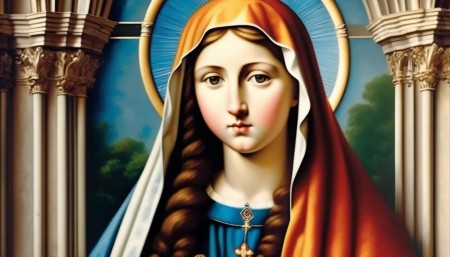Did Jesus Insult His Mother? Becoming Mother, Brother and Sister to the Lord
FREE Catholic Classes
I stand with the ancient Christian tradition, rooted in the writings of the early Church fathers, in interpreting these accounts.They present the opposite of this "mother is less important" claim. Instead, these accounts reveal a spirituality of communion and touch upon ecclesiology, an understanding of the Church. We are members of the family of God through Jesus Christ. We become his mothers, brothers and sisters as we live His Word and learn to walk in His Way. Mary is a model of such a loving surrender to God's Will.
Highlights
Catholic Online (https://www.catholic.org)
7/21/2015 (9 years ago)
Published in U.S.
Keywords: Family, family of God, church, Mary, Mother of God, spirituality, communion, Mary, mariology, mariolatry, church, ecclesiology, Catholic, Deacon Keith Fournier
CHESAPEAKE, VA (Catholic Online) - As someone who serves in the broader Christian community in my public ministry, I am sometimes asked by Christians of other communities about whether Jesus had brothers and sisters. If by that question is meant natural or blood relatives, I believe that both the text and the unbroken Christian tradition make the answer clear - No.
However, I am also asked about another Gospel account which can also be misinterpreted and which I will now address. It is found in all of the Synoptic Gospels, underscoring its importance. (See, Luke 8:19-21,Mark 3:31-35, and Matthew 12:48-50) The account from St Matthew presents the encounter in these words:
"While Jesus was speaking to the crowds, his mother and his brothers appeared outside, wishing to speak with him. Someone told him, "Your mother and your brothers are standing outside, asking to speak with you." But he said in reply to the one who told him, "Who is my mother? Who are my brothers?" And stretching out his hand toward his disciples, he said, "Here are my mother and my brothers. For whoever does the will of my heavenly Father is my brother, and sister, and mother."
Did Jesus Insult His Mother?
Of course not! In his sacred humanity, Jesus is the model for each one of us to imitate. Through His Saving Life, Death and Resurrection, He gives us the grace to do so. He surely loved his own mother with a deep and respectful love. This passage from the Gospel has a much deeper meaning. Our failure to consider the original language of the biblical text has also fueled a mistaken notion of the possibility of Jesus having brothers in what we call his natural family.
For westerners, we think of family in limited terms. We use the expression nuclear family to refer to it. The extended family was a vital part of the Jewish understanding of family. It included cousins and relatives. It is not accurately translated in some of the biblical texts. All of this is not a new debate. In was settled in the early, undivided Church, in the first millennium of Christian history.
Since the Protestant Reformation this particular misinterpretation has been used in misguided polemics which flow from both sides and add to the unfortunate and continuing divisions among Christians. More importantly, it misses the meaning and beauty of the passage for all Christians, no matter what their confession. Some have maintained that Jesus was making a comment intended to actually lessen the importance of his earthly mother. This "mother is unimportant" interpretation is mistaken.
It runs contrary to the biblical context of the encounter. It also rejects the consistent, unbroken Christian tradition concerning its meaning. Such a misreading ascribes a minimalist role to Mary in the Christian revelation and, consequently, in the life of every Christian and the Church. It can cause us to miss a vital truth concerning the Christian life and the meaning of the Church. It can discourage us from digging deeper into the text and grasping a profoundly important insight. This insight has great implications and can lead us to a deeper experience of the Christian life and vocation.
I stand with the ancient Christian tradition, rooted in the writings of the early Church fathers, in interpreting these accounts.They present the opposite of this "mother is less important" claim. Instead, these accounts reveal a spirituality of communion and touch upon ecclesiology, an understanding of the Church. We are members of the family of God through Jesus Christ. We become his mothers, brothers and sisters as we live His Word and learn to walk in His Way. Mary is a model of such a loving surrender to God's Will.
Through Baptism we enter this family of God and our entire life is meant to be lived in it. When we respond to grace - and live in obedience to the will and the Word of God - we grow into a deeper experience of our eternal relationship with God the Father, Son and Holy Spirit. As we respond to the continual invitations of grace, we become mother, sister and brother to the Lord. This begins in the Church, which is His Body, of which we are made members.
We are Family
This interchange between Jesus and the crowd outside was recorded in all of the synoptic Gospels for a reason. It was meant to help us understand who Jesus is - and who we are invited to become in Him. God is a God of love and relationship. He has invited all men and women into an eternal communion of love through Jesus Christ. He invites us into His Family.
The Gospel of John was the last Gospel to be written. It deepens the insight in these final words from the mouth of the Savior, "Behold your mother; behold your son". In His final act of Self-giving Love, revealed for all eternity on Golgotha's Hill, Jesus actually elevated and expanded the importance of the expression mother and brothers. We read about this encounter in the Gospel of St. John. Picture the poignant scene, right before He was to breathe His last breath:
"Standing by the cross of Jesus were his mother and his mother's sister, Mary the wife of Clopas, and Mary of Magdala. When Jesus saw his mother and the disciple there whom he loved, he said to his mother, "Woman, behold, your son."Then he said to the disciple, "Behold, your mother." And from that hour the disciple took her into his home." (John 19:26-27).
The early Fathers of the Church taught that this encounter at the Cross was also about more than the relationship between the Apostle John and Mary the mother of the Lord. It was about the expanded family of the Church, the community that Jesus came to found - and of which He is the Head - and we are the members.
Jesus Gives Us His Mother
As a final gift before He died, Jesus gave His mother to His whole family, through giving her to the beloved disciple John. This was a gift, an exchange, and an expansion of His family. The Christian tradition has long taught that in this exchange He entrusted all of us to her maternal care. So, the meaning of this exchange is connected to the passage from the Gospel of St. Matthew with which I began. Jesus was not minimizing His relationship with His mother in those words given in response to the crowd, He was expanding it.
Jesus hungers to include all of us in the family circle of God. In doing so, He invites us on the journey home to the Father's house in Him, through Him, and with Him, by the power of the Holy Spirit. In this exchange, Jesus opens up for those with eyes to see and ears to hear the deeper interior importance and meaning of the motherhood of Mary and the interior meaning of all family relationships renewed by the Holy Spirit.
The Church is the Family of God
This account gives a key insight - family relationships model and make present an eternal mystery, a plan. The Church is God's family. Understanding this insight, and living it, is a key to growing in faith and living the Christian life.
All who are incorporated into the Body of Jesus Christ through Baptism can begin to experience the life of Love between the members of the Trinity beginning now - and opening into eternity. Through His saving life, death and Resurrection, called the Paschal mystery, Jesus opens the way for all who do the will of His Father to enter into the family of God.
The Father of Jesus becomes our Father, as we enter, through Him, into the inner life of the Trinity. He underscored this truth right before He ascended when He instructed Mary of Magdala to tell the disciples "I am going to my Father and your Father, to my God and your God.' (John 20:17).
-----
Deacon Keith A. Fournier is Founder and Chairman of Common Good Foundation and Common Good Alliance. A married Roman Catholic Deacon of the Diocese of Richmond, Virginia, he and his wife Laurine have five grown children and seven grandchildren. He is also a human rights lawyer and public policy advocate who served as the first and founding Executive Director of the American Center for Law and Justice in the nineteen nineties. He has long been active at the intersection of faith and culture and currently serves as Special Counsel to Liberty Counsel. Deacon Fournier is a Senior Contributing writer for The STREAM.
---
'Help Give every Student and Teacher FREE resources for a world-class Moral Catholic Education'
Copyright 2021 - Distributed by Catholic Online
Join the Movement
When you sign up below, you don't just join an email list - you're joining an entire movement for Free world class Catholic education.
-

-
Mysteries of the Rosary
-
St. Faustina Kowalska
-
Litany of the Blessed Virgin Mary
-
Saint of the Day for Wednesday, Oct 4th, 2023
-
Popular Saints
-
St. Francis of Assisi
-
Bible
-
Female / Women Saints
-
7 Morning Prayers you need to get your day started with God
-
Litany of the Blessed Virgin Mary
Daily Catholic
 Daily Readings for Wednesday, November 27, 2024
Daily Readings for Wednesday, November 27, 2024 St. James Intercisus: Saint of the Day for Wednesday, November 27, 2024
St. James Intercisus: Saint of the Day for Wednesday, November 27, 2024 Prayer to Saint Anthony of Padua: Prayer of the Day for Wednesday, November 27, 2024
Prayer to Saint Anthony of Padua: Prayer of the Day for Wednesday, November 27, 2024- Daily Readings for Tuesday, November 26, 2024
- St. John Berchmans: Saint of the Day for Tuesday, November 26, 2024
- Act of Entrustment to Mary: Prayer of the Day for Tuesday, November 26, 2024
![]()
Copyright 2024 Catholic Online. All materials contained on this site, whether written, audible or visual are the exclusive property of Catholic Online and are protected under U.S. and International copyright laws, © Copyright 2024 Catholic Online. Any unauthorized use, without prior written consent of Catholic Online is strictly forbidden and prohibited.
Catholic Online is a Project of Your Catholic Voice Foundation, a Not-for-Profit Corporation. Your Catholic Voice Foundation has been granted a recognition of tax exemption under Section 501(c)(3) of the Internal Revenue Code. Federal Tax Identification Number: 81-0596847. Your gift is tax-deductible as allowed by law.









 Daily Readings for Wednesday, November 27, 2024
Daily Readings for Wednesday, November 27, 2024 St. James Intercisus: Saint of the Day for Wednesday, November 27, 2024
St. James Intercisus: Saint of the Day for Wednesday, November 27, 2024 Prayer to Saint Anthony of Padua: Prayer of the Day for Wednesday, November 27, 2024
Prayer to Saint Anthony of Padua: Prayer of the Day for Wednesday, November 27, 2024


